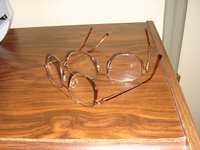Have You Cleaned Your Glasses?

Many years ago, I heard a piece of advice I liked immediately, and I have never forgotten it:
"Don't call the world dirty because you forgot to clean your glasses."
In communication terminology, that reference is to perception. Sometimes we cannot see the world around us accurately--the people and events--because dirty glasses mar our vision.
Consider these vision blockers on our "window to the world" (which is what perception really is) that distort our view:
Stereotypes: We assume that if someone is a member of a certain group, she is doomed to behave in a certain way. Examples: "Computer 'techies' don't have well-rounded personalities" or "Anybody over age 60 lacks energy enough to do the job."
Past experiences: "Margaret lost her temper at work a year ago, so I can never consider her for a leadership position. Obviously, she is too unstable."
Parental teachings: "My father told me that Rotary was the only club worth affiliating with, so I won't accept invitations to attend functions sponsored by other clubs."
What about you? Are there any spots on your glasses that make you think the world is dirty? If so, clean them off. Then you will communicate more accurately and productively.
For more information, please visit my Web site:
www.ChampionshipCommunication.com




